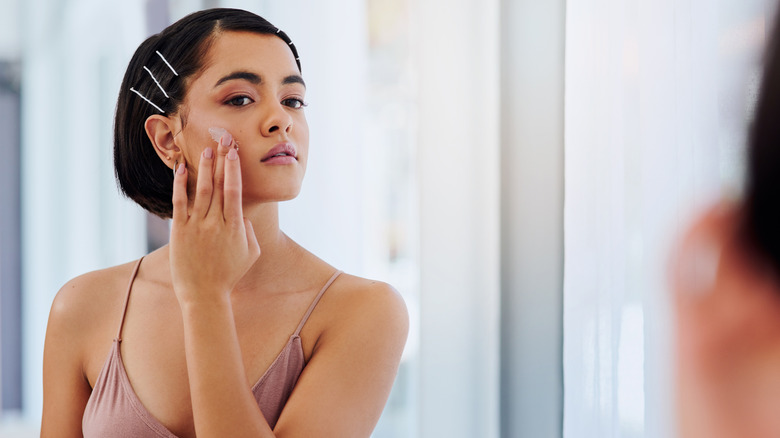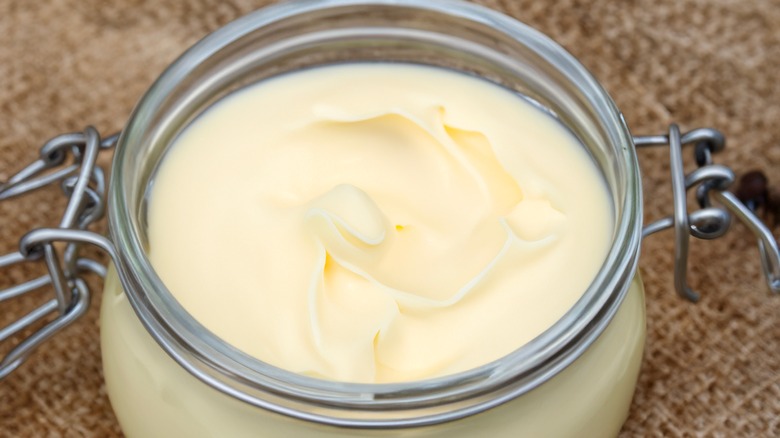What's The Deal With Tallow In Skincare? The Divisive Ingredient Explained
When it comes to finding the best moisturizer, you'd be amazed by what some companies put in their products. For example, both whale sperm and whale vomit have been used in creams, as well as bird poop, via How Stuff Works. Sure, the thought of smearing sperm and poop on one's face might be nauseating, but when it comes to skin that defies time and age, there's not much some people won't do. Kim Kardashian did say she'd eat a bowl of poop every day if it meant she'd never age, after all. So the fact that rendered beef fat, also called tallow, is making the rounds as a moisturizer, isn't entirely surprising.
"Beef tallow (like other types of saturated fat) is white in color and solid at room temperature, but melts when heated, such as when it is used in cooking," functional dietitian Jenna Volpe, RDN, LD told Livestrong. "Beef tallow can be used as a cooking fat (in place of butter or lard), but it can also be applied topically for skin care purposes."
But just because it can be applied to your skin, should you make it part of your skincare routine? Also, do you really know where your tallow is coming from when you buy it? So much about tallow is up in the air, that it should definitely give everyone pause before jumping on this trend.
The potential benefits of tallow
Off the bat: animal fat can be a powerful moisturizer. It's chockfull of oleic acid, palmitic acid, and stearic acid, and your skin loves that, per Refinery 29. "Beef tallow is rich in omega-3 fatty acids that can be helpful to soften the skin, strengthen the skin barrier, and serve as an anti-inflammatory," board-certified dermatologist Marisa Garshick, M.D., FAAD told MindBodyGreen. Because it's all-natural and doesn't consist of fragrances, it's also less likely to irritate the skin, even those with sensitive skin types.
"[Tallow is] composed of fats that are surprisingly very similar in composition to our skin's own natural oil," associate professor and director of cosmetic and clinical research at Mount Sinai Hospital, Dr. Joshua Zeichner, told Insider. Also known as sebum, these natural oils are essential in keeping the skin healthy and moisturized, especially as you age and as your skin is exposed to the elements. "As you age, the skin produces less of certain lipids, which can lead to volume loss, skin dullness, and laxity accentuating the signs of aging," board-certified dermatologist Dr. Ife Rodney told HuffPo. "Topical lipids (or fats) can support the deeper skin structures as they hydrate the skin and improve skin barrier function."
How tallow can be problematic
Often when people jump on social media trends, they take what they see at face value and don't do the research. This is problematic especially when it's coming from people on TikTok who don't have a medical license or PhD in dermatology. Influencers should always be the last group of people you turn to for legit, safe, and smart advice. "Tallow is not approved by the FDA to be used in skin care because of the risk of bovine spongiform encephalopathy, or mad cow disease," dermatologist Dr. Mamina Turegano told Glamour.
Not only is the lack of regulation possibly an issue, but there are some ethics involved too. Both the sourcing and purity of the tallow could be shady or compromised when companies don't have the FDA breathing down their neck. There's a big difference between beef tallow from a farm that puts the welfare of animals first, as opposed to factory-farmed cattle which are often injected with various drugs. "Many people are looking for options that are cruelty-free, sustainable, and 'clean,' and beef tallow is none of these," board-certified dermatologist Dr. Hadley King told HuffPo.
On the surface, tallow can seem like a good idea, but considering the other options out there for moisturizers, it's best to skip this one. Unless of course, you're willing to be a guinea pig. "The safety and effectiveness of tallow for skin care requires further research," board-certified dermatologist Dr. Peter C. Young told NBC.


